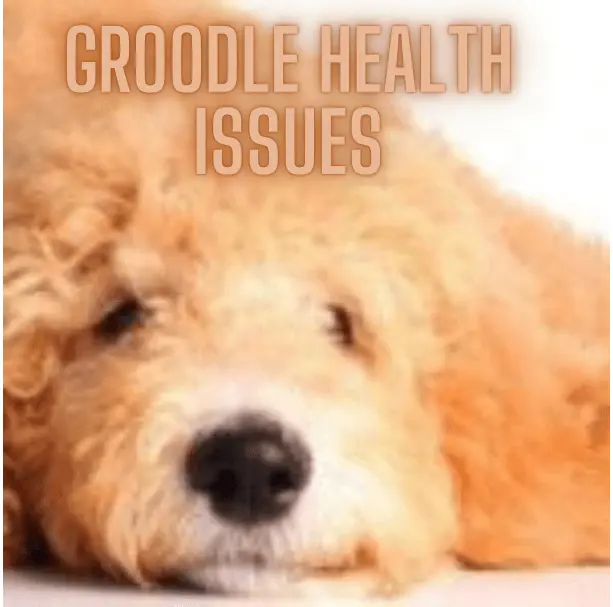Introduction:
Groodle Health Issues are a big concern for Groodle owners. Groodles, or Goldendoodles as they’re formally known, are a charming blend of Golden Retrievers and Poodles. This hybrid has won hearts with its intelligence, social demeanor, and hypoallergenic coat, making it a sought-after companion for many families. However, like all other breeds, Groodles can also face some common health issues due to their genetic linkage.
Overview of Groodle Genetics
The health issues in Groodles largely arise from the genetic traits inherited from their parent breeds. While hybrid vigor—a phenomenon where mixed breeds tend to have fewer genetic health problems than purebreds. This phenomenon can offer some protection, but it does not eliminate the possibility of health concerns. Both the Golden Retrievers and Poodles have their own sets of hereditary health problems, which can be passed on to their offspring.
The health of a Groodle depends on several factors:
- Genetics
- Breeding Practices
- Environment
- Care
In well-bred Groodles, many potential health problems can be minimized, but some health concerns are still prevalent.
Dr. Matthew Wheaton, owner of Alicia Pet Care Center in Mission Viejo, California, explains that Goldendoodles tend to have fewer health issues than purebred dogs, such as Golden Retrievers or Standard Poodles. By combining these two breeds, the health risks are reduced rather than increased.
Common Groodle Health Issues
1. Hip Dysplasia
Hip dysplasia is a common skeletal condition in many large dog breeds, including both Golden Retrievers and Poodles. It occurs when the hip joint doesn’t fit together correctly, causing pain and difficulty in movement.
Prevalence:
Approximately 20% of all dogs suffer from hip dysplasia, but it’s notably common in Golden Retrievers. According to the Orthopedic Foundation for Animals (OFA), an estimated 19.6% of the breed is affected.
Symptoms:
Common symptoms of hip dysplasia are:
- Limping
- Difficulty rising or lying down
- Reluctance to Exercise
- Noticeable decrease in thigh muscle mass
Prevention & Treatment:
Responsible breeders test for hip dysplasia and ensure they only breed dogs with healthy hips. Weight management and regular exercise help to mitigate symptoms. Dogs with mild cases can often live comfortably with the help of non-steroidal anti-inflammatory drugs (NSAIDs) and supplements. In severe cases, surgery or hip replacement may be necessary.
2. Elbow Dysplasia
Similar to hip dysplasia, elbow dysplasia is a condition where the elbow joint does not develop correctly, leading to arthritis and pain. It is especially common in larger breeds like the Groodle.
Prevalence:
The OFA reports that around 10% of Golden Retrievers and Standard Poodles are affected by elbow dysplasia.
Symptoms:
Common symptoms of elbow dysplasia are:
- Lameness
- Stiffness
- Reluctance to Play
- Pain upon Palpation of the Elbows.
Prevention & Treatment:
Elbow dysplasia can be treated with weight control, physical therapy, and, in extreme cases, surgery.
3. Progressive Retinal Atrophy (PRA)
Progressive Retinal Atrophy is an inherited condition that leads to the gradual degeneration of the retina, eventually causing blindness. Both Golden Retrievers and Poodles are susceptible to PRA, which means Groodles can inherit this condition.
Prevalence:
PRA is reported in about 1-2% of Poodles, while the prevalence in Golden Retrievers is slightly lower.
Symptoms:
Symptoms in Groodles usually start to appear when they reach 3 to 5 years of age. The dog initially becomes partially blind, which is difficult to detect because they can memorize their environment remarkably well. Common symptoms of PRA are:
- Night blindness
- Dilated Pupils
- Bumping into Objects
- Complete Vision Loss (After about 1-2 years)
Prevention & Treatment:
Genetic testing can help identify carriers of the PRA gene, and responsible breeders should avoid mating dogs that carry the gene. While there is no cure for PRA, the progression may be slowed with the use of antioxidants and vitamin A supplements..
4. Von Willebrand’s Disease
Von Willebrand’s Disease is a genetic bleeding disorder in which the blood doesn’t clot properly. This condition is more common in Poodles but can also affect Groodles.
Prevalence:
Around 10-30% of Poodles carry the gene for Von Willebrand’s Disease, but not all will exhibit symptoms.
Symptoms:
Common symptoms of Von Willebrand’s Disease are:
- Excessive Bleeding after injury or surgery
- Nosebleeds
- Spontaneous Bleeding from the Gums
- Lameness and stiffness are common symptoms of internal bleeding in the joints or muscles.
Prevention & Treatment:
Genetic testing is crucial to avoid breeding dogs that carry the gene. Treatment typically involves managing bleeding episodes with blood transfusions or medications.
5. Ear Infections
Due to their floppy ears, Groodles are susceptible to ear infections as the ears can trap moisture and bacteria. This condition is particularly common in breeds with long, hairy ears.
Prevalence:
Ear infections are common in both Poodles and Golden Retrievers, with an estimated 15-20% of dogs in these breeds suffering from recurrent ear infections.
Symptoms:
Excessive moisture, bacterial or yeast overgrowth, and allergies commonly cause ear infections in Groodles. Common symptoms to identify that your groodle has ear infection are:
- Ear Scratching
- Head-Shaking
- Foul odor from the ears
- Redness or swelling in the ear canal
Prevention & Treatment:
Regular ear cleaning and grooming can prevent infections. Treatment typically involves cleaning the ear canal and administering antibiotics or antifungal medications.
6. Hypothyroidism
Hypothyroidism is a condition in which the thyroid gland produces insufficient hormones, resulting in a slower metabolism. It is a common issue in both Golden Retrievers and Poodles, and thus Groodles can also be affected.
Prevalence:
Around 10% of Golden Retrievers suffer from hypothyroidism.
Symptoms:
Common symptoms that will help you to identify this disease, are:
- Weight Gain
- Lethargy
- Hair Loss
- Cold Intolerance
- Skin Infections
- Slow Heart Rate
- High Blood Cholesterol.
Prevention & Treatment:
While there is no way to prevent hypothyroidism, it can be managed with daily hormone replacement therapy.
7. Allergies
Groodles may experience a range of allergies, including food, environmental, and contact allergies. These allergies often lead to skin problems and digestive issues.
Prevalence:
Allergies affect roughly 10-20% of dogs, and Groodles are no exception.
Symptoms:
Different allergies can be identified by different symptoms by some common symptoms are:
- Itching
- Red or Inflamed Skin
- Chronic Ear Infections
- Gastrointestinal Upset
Prevention & Treatment:
Identifying the allergen and avoiding it is the best prevention. Treatment may involve antihistamines, steroids, or special diets.
8. Gastric Dilatation-Volvulus (Bloat )
Gastric Dilatation-Volvulus, or Bloat, is a critical condition where the stomach becomes distended with gas and rotates, blocking blood flow to vital organs. This life-threatening issue is most common in larger, deep-chested breeds like Groodles.
Prevalence:
Around 5-10% of large dog breeds are affected by Gastric Dilatation-Volvulus.
Symptoms:
Here are some symptoms by which you can identify this issue:
- Swollen abdomen
- Drooling
- Restlessness
- Attempts to vomit without success
GDV can lead to serious complications like dehydration, a ruptured stomach, and inflammation of the abdominal cavity.
Prevention & Treatment:
Avoid feeding your Groodle large meals in one sitting, and discourage vigorous exercise after eating. Gastric Dilatation-Volvulus is a medical emergency that demands immediate surgical intervention.n. GDV surgery restores the stomach to its normal position and releases trapped gas. After GDV surgery, dogs need to rest and eat a diet of small, frequent meals to allow their stomachs to heal properly. It’s important to avoid letting your dog exercise for at least 30 minutes to an hour before or after a meal.
9. Addison’s Disease:
Addison’s disease in Groodles, also known as hypoadrenocorticism, is a condition where the adrenal glands fail to produce enough hormones. It leads to a variety of health issues. Addison’s is relatively rare, affecting about 0.1% to 0.5% of dogs, and can be life-threatening if left untreated
Symptoms:
The symptoms include:
- Lethargy
- Vomiting
- Diarrhea
- Weight Loss
- Increased thirst or Urination
Prevention and Treatment:
Preventive measures are limited, but early detection and regular vet checkups can help manage the disease. Treatment typically involves hormone replacement therapy and managing stress to prevent flare-ups.
10. Dermatitis:
Dermatitis is a common skin condition caused by allergies, parasites, or irritants, leading to inflammation and itching. Dermatitis affects a significant number of dogs, especially those with sensitive skin or allergy-prone breeds like Groodles.
Symptoms:
Common symptoms include:
- Redness
- Hair Loss
- Constant Scratching
- Flaky Skin
Prevention and Treatment
To prevent dermatitis, regular grooming, flea control, and using hypoallergenic products are essential. Treatment depends on the cause and may include medicated shampoos, antihistamines, or antibiotics for secondary infections. Regular vet checkups can help catch and manage this condition early.
12. Dilated Cardiomyopathy (DCM)
Dilated Cardiomyopathy (DCM) is a serious heart condition where the heart muscle becomes weak and enlarged, leading to poor blood circulation. DCM is more common in large breeds, but Groodles can be affected due to their genetic background.
Symptoms
Symptoms include:
- Fatigue
- Coughing
- Shortness of breath
- Fainting
Prevention and Treatment
While the exact prevalence in Groodles is unclear, DCM can be life-threatening if not treated. Preventive measures include regular veterinary checkups and a balanced diet, as some cases have been linked to certain grain-free diets. Treatment typically involves medication to support heart function and manage symptoms.
13. Obesity:
Obesity in Groodles is a growing concern, characterized by excess body fat that can lead to various health problems. Statistics show that approximately 25-30% of dogs in the U.S. are considered obese, with similar trends seen in Groodles
Symptoms:
Symptoms of obesity include:
- Noticeable Weight Gain
- Difficulty in movement
- Visibly rounded abdomen
Overweight Groodles may experience an increased risk of diabetes, joint issues, and heart disease.
Prevention and Treatment
Preventing obesity involves providing a balanced diet, portion control, and regular exercise.
Preventive Measures for Groodle Health Issues
Preventing health problems in Groodles starts with selecting a responsible breeder. Good breeders test their dogs for genetic conditions and choose healthy parents to reduce the risk of hereditary diseases. Here are some general preventive measures:
- Genetic Testing: Ensure that the breeder conducts genetic testing for conditions like PRA, hip and elbow dysplasia, and Von Willebrand’s Disease.
- Regular Veterinary Check-ups: Routine health exams can catch potential issues early before they become serious.
- Proper Diet and Exercise: A balanced diet and regular exercise are crucial in preventing obesity, which can exacerbate conditions like hip dysplasia and hypothyroidism.
- Grooming and Hygiene: Regular grooming helps prevent skin infections, ear infections, and other hygiene-related issues. Groodles’ coats can mat easily, so they require frequent brushing and trimming.
- Vaccinations and Parasite Prevention: Keeping your Groodle up-to-date on vaccinations and parasite preventatives will reduce the risk of diseases like heartworm, ticks, and fleas.
- Weight Management: Keeping your Groodle at a healthy weight can significantly reduce the risk of joint problems like hip and elbow dysplasia.
Groodle Health Issues Treatment Pricings:
These are the average costs of treatments for different diseases. The prices can be different from region to region and also different metaphors such as surgical treatment, non-surgical treatment, etc can change the cost of treatment.
| Hip Dysplasia | $1000 to $7,000 |
| Elbow Dysplasia | $1,500 to $4,000 |
| Progressive Retinal Atrophy (PRA) | $200 to $1,500 |
| Von Willebrand’s Disease | $500 to $3,000 |
| Ear Infections | $150 to $800 |
| Hypothyroidism | $300 to $800 |
| Gastric Dilatation-Volvulus (Bloat ) | $1,500 to $5,000 |
| Addison’s Disease | $500 to $3,000 |
| Dilated Cardiomyopathy (DCM) | $500 to $3,500 |
Groodle Health Issues FAQs
Q1. What are common health issues in Groodles? Groodles can experience several health issues, including allergies like dermatitis, genetic conditions such as Addison’s disease and Dilated Cardiomyopathy, and obesity. Regular checkups and a healthy lifestyle can help manage and prevent these problems. Q2. How can I prevent health problems in my Groodle? To prevent health issues in Groodles, focus on a balanced diet, regular exercise, and routine veterinary visits. Q3. How can I tell if my Groodle is developing a health problem? Common signs that your Groodle may be developing a health issue include changes in appetite, weight loss or gain, excessive scratching or licking, changes in energy levels, and unusual behaviors such as increased thirst or frequent urination. Q4. What are the leading causes of death for Groodles? If left untreated, conditions such as bloat, cancer, thyroid problems, heart disease, or Addison’s Disease can be fatal for Groodles. Q5. Do Groodles have a high incidence of health issues? By combining two breeds, Groodles generally have less breed-specific health issues compared to their parent breeds. |
Conclusion
In conclusion, while Groodles are generally healthy and vibrant dogs, they are not immune to certain health issues that can impact their well-being. From conditions like Addison’s disease and dermatitis to more serious concerns such as Dilated Cardiomyopathy and obesity, owners must be aware of these potential problems. Regular veterinary checkups, a balanced diet, and proper care can help in the early detection and management of these issues. By staying informed and proactive, Groodle owners can ensure their furry companions lead happy, healthy lives.




